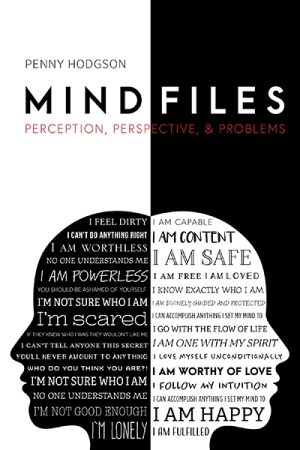
Mind Files
Perception, Perspective, & Problems
Mind Files is an accessible self-help book that encourages moving past negative thought patterns to live joyfully and appreciatively.
An approachable guide to understanding how the mind processes experiences for future reference, Penny Hodgson’s Mind Files is a helpful tool for working through trauma and dealing with negative emotions.
Hodgson posits that the mind files memories into categorical folders—fear, love, or neutral. She suggests that our brains are designed to organize our experiences in a way that protects us—though sometimes this automatic categorizing of experiences leads us to repeat mistakes, react inappropriately, or develop detrimental habits. The book explains such classifications in the most basic terms; it then explores why issues such as addiction, depression, and anxiety occur, and the steps that need to be taken to reverse those outcomes.
Each chapter discusses other basic psychological points, including how adult drama is tied to childhood experiences, and how we are conditioned and trained to react in certain ways. Explorations include topics from labeling people—and the problems that arise because of labeling—to exclusionary behavior. It explores the origins of behavioral patterns as well as methods of changing one’s habits, and forwards exercises and tasks specifically aimed toward healing and healthy living.
The book’s techniques aren’t new; many of the ideas and methods are widely known and practiced, but the book serves as a good primer. It breaks down basic psychology into easily understandable pieces, and its straightforward approach is useful. Diagrams are helpful as they illustrate the filing system analogy, but they become repetitive; the same pictures are continually used to discuss similar ideas.
The book sometimes seems short on necessary details, and it just scratches the surface of dealing with emotional and mental trauma. Hodgson’s real-life experiences are related in a raw, honest way. The book emphasizes other aspects of mental and emotional health as well, including how the mind and body coexist. It encourages exercise, clean and healthy eating, and taking supplements and medicine.
The book’s questions and exercises are helpful, approachable, and easy to work through, including journal prompts and word associations. Example scenarios help with reflection, learning, and repairing damage. The approach is diverse in its consideration of ways of changing damaging thought patterns. Inward questions and reflections are encouraged.
Mind Files is an accessible self-help book that encourages moving past negative thought patterns to live joyfully and appreciatively.
Reviewed by
Katie Asher
Disclosure: This article is not an endorsement, but a review. The publisher of this book provided free copies of the book and paid a small fee to have their book reviewed by a professional reviewer. Foreword Reviews and Clarion Reviews make no guarantee that the publisher will receive a positive review. Foreword Magazine, Inc. is disclosing this in accordance with the Federal Trade Commission’s 16 CFR, Part 255.
